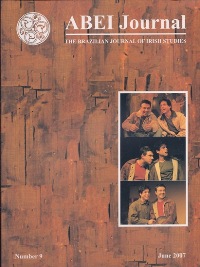“Araby” in Ireland: An Imperial Wolf in Sheik’s Clothing
DOI:
https://doi.org/10.37389/abei.v9i0.3691Palavras-chave:
James Jpuce, Araby, British Empire.Resumo
While many believe that “Araby” is a story of a young boy’s early realization of the futility of turn-of-the-century Dublin life, I propose that its detached narrator tells the story in such a way that he acknowledges that he understands of how Ireland is being manipulated by the British government and that such a realization is the basis for change. If like the boy, the Irish fall into the not always negative stereotype that they are romantic (that is, “original”) by nature, they run the risk of falling prey to those who would try to capitalize on this tendency. Instead of, as they boy did, trying to fill the national type of the romantic wanderer, the religious crusader, he who blindly loves that which symbolizes his nation, the Irishman should strive to be an individual so as not to fall into the trap of the English colonizer. It is possible that it is not the creating of the “Orient” that is hazardous, but that the Orient created by the wrong people is hazardous. Perhaps in his manipulation of the factual occurrence of the bazaar, Joyce was actually showing that despite the glamour that the English sponsors of the bazaar wanted the Irish patrons to see, so that they would spend money and have a greater reverence for the magnanimity of the Empire, the promise of opulence for the Irish through the Empire is empty, and
is self-serving, benefiting only the Empire itself.
Referências
Almond, Ian. “Tales of Buddha, Dreams of Arabia: Joyce and Images of the East.” Orbis Litterarum 57.1 (2002): 18-30.
Cheng, Vincent J. Joyce, Race, and Empire. Cultural Margins. New York: Cambridge UP, 1995.
Coulthard, A.R. “Joyce’s Araby.” Explicator 52.2 (Winter 1994): 97-99.
Cullingford, Elizabeth Butler. “Phoenician Genealogies and Oriental Geographies: Joyce, Language, and Race.” Semicolonial Joyce. Eds. Derek Attridge and Marjorie Howes. New York: Cambridge UP, 2000.
Egan, Joseph J. “Romantic Ireland, Dead and Gone: Joyce’s ‘Araby’ as National Myth.” The Colby Library Quarterly 15 (1979): 188-93.
Ehrlich, Heyward. “‘Araby’ in Context: The ‘Splendid Bazaar,’ Irish Orientalism, and James Clarence Mangan.” James Joyce Quarterly 35.2-3 (1998 Winter-Spring): 309-31.
_____. “Joyce’s ‘Araby’ and the ‘Splendid Bazaar’ of 1894.” James Joyce Literary Supplement 7 (Spring 1993): 18-20.
Fallon, William G. Memoir. O’Connor 39-62.
Grenby, M.O. “Orientalism and Propaganda: The Oriental Tale and Popular Politics in Late-Eighteenth-Century Britain.” The Eighteenth-Century Novel 2 (2002): 215-37.
Joyce, James. Dubliners. Ed. Shane Weller. New York: Dover Publications, 1991.
_____. “James Clarence Mangan.” The Critical Writings of James Joyce. Eds. Ellsworth Mason and Richard Ellman. New York: Viking Press, 1959.
Lang, Frederick K. “Rite East of Joyce’s ‘Araby.’” Journal of Ritual Studies 1.2 (Summer 1987): 111-20.
Leerssen, Joseph Th. “One the Edge of Europe: Ireland in Search of Oriental Roots, 1650-1850.” Comparative Criticism 8 (1986): 94-101.
Lloyd, David. “James Clarence Mangan’s Oriental Translations and The Question of Origins.” Comparative Literature 38.1 (Winter 1986): 20-35.
Magalaner, Marvin and Richard M. Kain. Joyce: The Man, the Work, the Reputation. New York: New York UP, 1956.
Mangan, James Clarence, trans. “Dark Rosaleen.” The Young Irelanders. T. F. O’Sullivan. Tralee, Ireland: The Kerryman, Ltd. 1944. 512-14.
Moran, D.P. Excerpt from The Leader. 22 December 1900. The Field Day Anthology of Irish Writing. Vol. 11. Ed. Seamus Deane. Derry, Ireland: Field Day Publications, 1991.
Norris, Margot. “Blind Streets and Seeing Houses: Araby’s Dim Glass Revisited.” Studies in Short Fiction 32.3 (Summer 1995): 309-18.
O’Connor, Ulick, ed. The Joyce We Knew. Cork: The Mercier Press, 1967.
Potts, Willard. Joyce and the Two Irelands. Austin: U of Texas P, 2000. Power, Arthur. Memoir. O’Connor 95-124.
Schneer, Jonathan. London 1900: The Imperial Metropolis. New Haven: Yale UP, 1999.
Williams, Trevor L. “No Cheer for ‘the Gratefully Oppressed’: Ideology in Joyce’s Dubliners.” ReJoycing: New Readings of Dubliners. Eds. Rosa M. Bollettieri Bosinelli and Harold F. Mosher Jr. Lexington: The UP of Kentucky, 1998. 87-109.


